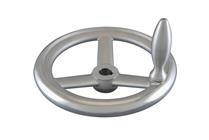
Three new sizes have been added to engineering components supplier WDS Component Part’s range of stainless steel handwheels, so that end users and OEMs can select an appropriate size for each application.
Previously offering a sinlge size, but with a choice of round or keywayed mounting hole, WDS now includes in its catalogue stainless steel handwheels in 100mm, 160mm, 200mm and 315mm overall diameter. The choice of round or keywayed mounting hole remains for all sizes.
All variations are machined from cast stainless steel (grade S3100:1991:316C16F) with the rim given a polished finish. They weight from 500g for the smallest wheels to 6,200g for the largest. The three smaller sizes are all three-spoke designs; the largest 315mm wheels have five spokes.
Ergonomics is important for handwheels, as they have to "feel right" and have a profile that is easy to use. To this end, the rim is relatively wide (15mm to 35mm) and easy to grip. Further the rise generated by the angle of the spokes produces a generous space (17mm to 33mm) between the rim and the machine or panel behind it, making the wheel easy to use and reducing the risk of fingers feeling like they are too big.
Contact Details
Related Glossary Terms
- reaction injection molding ( RIM)
reaction injection molding ( RIM)
Molding process that allows the rapid molding of liquid materials. The injection-molding process consists of heating and homogenizing plastic granules in a cylinder until they are sufficiently fluid to allow for pressure injection into a relatively cold mold, where they solidify and take the shape of the mold cavity. For thermoplastics, no chemical changes occur within the plastic, and, consequently, the process is repeatable. The major advantages of the injection-molding process are the speed of production; minimal requirements for postmolding operations; and simultaneous, multipart molding.
